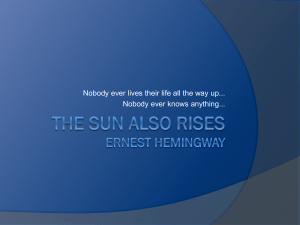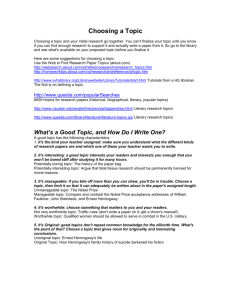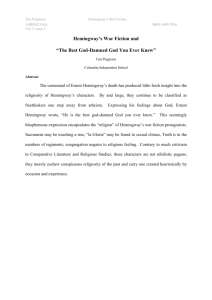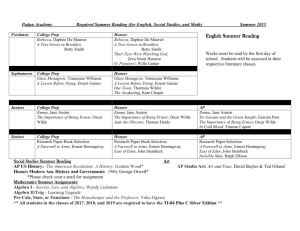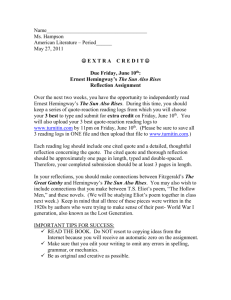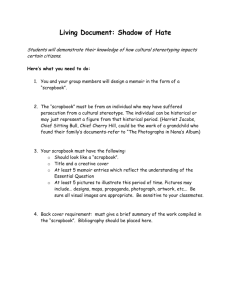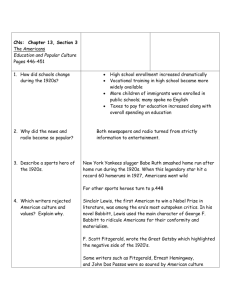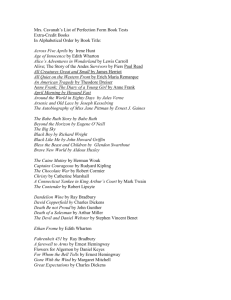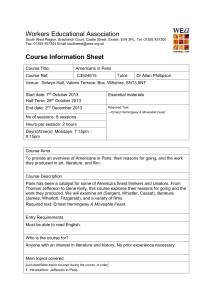museum trip - School of Science & Technology
advertisement
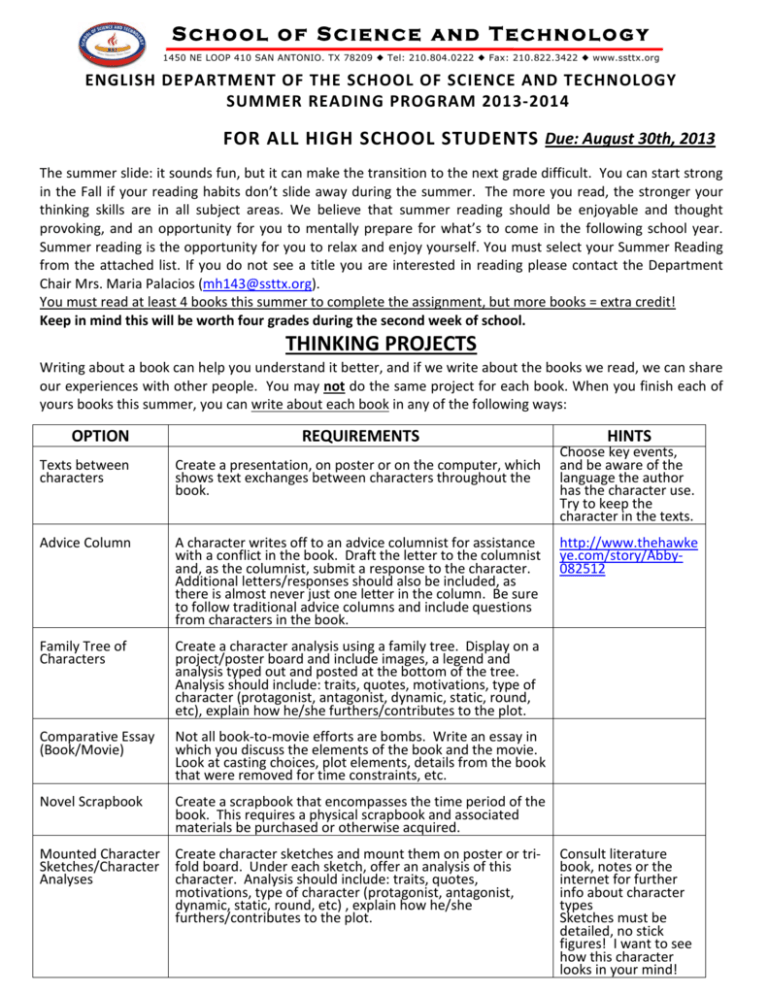
School of Science and Technology 1450 NE LOOP 410 SAN ANTONIO. TX 78209 Tel: 210.804.0222 Fax: 210.822.3422 www.ssttx.org ENGLISH DEPARTMENT OF THE SCHOOL OF SCIENCE AND TECHNOLOGY SUMMER READING PROGRAM 2013-2014 FOR ALL HIGH SCHOOL STUDENTS Due: August 30th, 2013 The summer slide: it sounds fun, but it can make the transition to the next grade difficult. You can start strong in the Fall if your reading habits don’t slide away during the summer. The more you read, the stronger your thinking skills are in all subject areas. We believe that summer reading should be enjoyable and thought provoking, and an opportunity for you to mentally prepare for what’s to come in the following school year. Summer reading is the opportunity for you to relax and enjoy yourself. You must select your Summer Reading from the attached list. If you do not see a title you are interested in reading please contact the Department Chair Mrs. Maria Palacios (mh143@ssttx.org). You must read at least 4 books this summer to complete the assignment, but more books = extra credit! Keep in mind this will be worth four grades during the second week of school. THINKING PROJECTS Writing about a book can help you understand it better, and if we write about the books we read, we can share our experiences with other people. You may not do the same project for each book. When you finish each of yours books this summer, you can write about each book in any of the following ways: OPTION REQUIREMENTS Texts between characters Create a presentation, on poster or on the computer, which shows text exchanges between characters throughout the book. Advice Column A character writes off to an advice columnist for assistance with a conflict in the book. Draft the letter to the columnist and, as the columnist, submit a response to the character. Additional letters/responses should also be included, as there is almost never just one letter in the column. Be sure to follow traditional advice columns and include questions from characters in the book. Family Tree of Characters Create a character analysis using a family tree. Display on a project/poster board and include images, a legend and analysis typed out and posted at the bottom of the tree. Analysis should include: traits, quotes, motivations, type of character (protagonist, antagonist, dynamic, static, round, etc), explain how he/she furthers/contributes to the plot. Comparative Essay (Book/Movie) Not all book-to-movie efforts are bombs. Write an essay in which you discuss the elements of the book and the movie. Look at casting choices, plot elements, details from the book that were removed for time constraints, etc. Novel Scrapbook Create a scrapbook that encompasses the time period of the book. This requires a physical scrapbook and associated materials be purchased or otherwise acquired. Mounted Character Sketches/Character Analyses Create character sketches and mount them on poster or trifold board. Under each sketch, offer an analysis of this character. Analysis should include: traits, quotes, motivations, type of character (protagonist, antagonist, dynamic, static, round, etc) , explain how he/she furthers/contributes to the plot. HINTS Choose key events, and be aware of the language the author has the character use. Try to keep the character in the texts. http://www.thehawke ye.com/story/Abby082512 Consult literature book, notes or the internet for further info about character types Sketches must be detailed, no stick figures! I want to see how this character looks in your mind! School of Science and Technology 1450 NE LOOP 410 SAN ANTONIO. TX 78209 Tel: 210.804.0222 Fax: 210.822.3422 www.ssttx.org ENGLISH DEPARTMENT OF THE SCHOOL OF SCIENCE AND TECHNOLOGY SUMMER READING PROGRAM 2013-2014 Historical Novel Presentation Similar to the option with historical non-fiction, you will create a tri-fold that presents information about your book, characters, setting, plot elements, author, and his/her style. You will then be required to show that you have researched that time period and what the trends, norms, culture, style were like at that time. You will also need to explain during your presentation whether you believe that the author did an appropriate job of researching the time period before writing the book. The more interactive/3-D it is, the better. Use your imagination! Author-itis Sometimes we fall in love with the author’s writing style and want to read everything they’ve written. If you’ve done this, you may write an essay comparing two or more pieces. Discuss the types of characters used, styles of writing, similarities, differences, etc. Dig deep on this one, each of those books is a glimpse into the author’s mind, and what they think about the world. How are they using language, dialogue, narration, suspense, etc. Non-fiction Tri-fold (Historical Adaptation) On a tri-fold board, in whatever order you choose: Use one side to display author information, summary, description of topic and background. Use the second section to present vocabulary, ideas and opinions of the author. On the third flap, write your reactions and ideas as the reader. How did this change the way you think, feel or see the world? Use quotations and page numbers on your display. (Include a timeline or map) Creative Writing Research Prezi Presentation Your creative work can be anything that relates to the book: a song, a poem, a short story, a play, a film, or any combination of genres. You can re-write a scene from the perspective of another character. You could re-imagine the plot in a different setting. You could re-write the ending. You could write a poem that deals with a theme or a character in the book. Whatever kind of text you write, include an explanation that links your creative work back to the book you read. Explain how your work is related to the author’s work. Select an interesting issue raised in the book. Write a brief explanation of how the issue was raised and why you find it interesting. Research the topic further, and write about your research, citing sources as needed. Create a multi-media presentation using Prezi.com about the book documenting any of the ways the text connects with you, with other texts, or with the world around you. 2 pages minimum 2 page School of Science and Technology 1450 NE LOOP 410 SAN ANTONIO. TX 78209 Tel: 210.804.0222 Fax: 210.822.3422 www.ssttx.org ENGLISH DEPARTMENT OF THE SCHOOL OF SCIENCE AND TECHNOLOGY SUMMER READING PROGRAM 2013-2014 VOCABULARY People who read have expansive vocabularies. We can make an inference that, as you read and come in contact with new words, you will learn the new words. To help you learn some new words as you read this summer, we ask that you document new and unfamiliar words. For each book, please find at least ten words you do not know. You must use the format below to gather information about the new words you find in your reading. HIGH SCHOOL SUMMER READING LIST Ralph Ellison – Invisible Man Joseph Conrad – Heart of Darkness or The Secret Sharer Ernest Hemingway – The Sun Also Rises and A Farewell to Arms Hermann Hesse – Steppenwolf and The Glass Bead Game Robert Pirsig – Zen and the Art of Motorcycle Maintenance Samuel Butler – The Way of All Flesh Somerset Maugham - Of Human Bondage Sylvia Plath – The Bell Jar Cormac McCarthy – Blood Meridian Umberto Eco – The Name of the Rose Jean-Paul Sartre – The Age of Reason Thomas Mann – Death in Venice, Magic Mountain, Doctor Faustus F. Scott Fitzgerald – The Beautiful and the Damned and Tender is the Night Thomas Hardy – Jude the Obscure Virginia Wolff – To The Lighthouse and Ms. Dalloway Fyodor Dostoyevsky – Notes from the Underground / The Idiot / Crime and Punishment Robert Graves – Goodbye to All That Nikolai Gogol – Dead Souls Franz Kafka – The Trial and Metamorphosis Voltaire – Candide Alexander Dumas – The Three Musketeers Marcel Proust – Swann’s Way Charles Dickens – Great Expectations and Hard Times E.M. Forster – Howard’s End Ernest Gaines - A Lesson Before Dying Alexie Sherman - The Absolute True Diary of a Part-Time Indian Walter Dean Myers - Fallen Angels Ray Bradbury - Fahrenheit 451 School of Science and Technology 1450 NE LOOP 410 SAN ANTONIO. TX 78209 Tel: 210.804.0222 Fax: 210.822.3422 www.ssttx.org ENGLISH DEPARTMENT OF THE SCHOOL OF SCIENCE AND TECHNOLOGY SUMMER READING PROGRAM 2013-2014 Amy Tan - The Joy Luck Club Upton Sinclair - The Jungle William Golding - Lord of the Flies Franz Kafka - Metamorphosis Sue Monk Kidd - The Secret Lives of Bees Laurie Halse Anderson - Speak John Grisham - A Time to Kill Scott Westerfeld - The Uglies (part of a series) Todd Strasser - The Wave Frank McCourt - Angela’s Ashes Thomas Foster - How to Read Literature Like a Professor Elie Wiesel - Night Dan Gediman and Jay Allison - This I Believe Franklin Covey - Seven Habits of Highly Effective Teams S. A. Bodeen – Compound John Green - The Fault in Our Stars John Steinbeck - Of Mice and Men Bryce Courtenay - The Power of One J.D. Salinger - The Catcher in the Rye Ayn Rand - Atlas Shrugged Stephen Ambrose - Band of Brothers F. Scott Fitzgerald - The Great Gatsby Ernest Hemingway - Farewell to Arms Anne Tyler - Dinner at the Homesick Restaurant Aldous Huxley - Brave New World Chris Gardner - The Pursuit of Happyness David Mitchell - Black Swan Green Edwidge Danticat - Breath, Eyes, Memory Loung Ung - First They Killed My Father Nikita Lalwani - Gifted: A Novel Jonathan Swift - Gulliver’s Travels Markus Zusak - The Book Thief Alexandre Dumas - The Count of Monte Cristo John Fowles - The French Lieutenant’s Woman Margaret Atwood - The Handmaid's Tale Oscar Wilde - The Importance of Being Earnest Khaled Hosseini - The Kite-Runner Chimamanda Ngozi Acichie - The Thing Around Your Neck Daoud Hari - The Translator Yann Martel - Life of Pi Charlotte Bronte - Jane Eyre Ernest Hemingway - The Sun Also Rises Kate Chopin - The Awakening T. S. Eliot - Murder in the Cathedral Mary Shelley - Frankenstein Judith Clarke - One Whole and Perfect Day Veronica Roth - Divergent Allie Condie - Matched Deborah Ellis - No Safe Place Christine Fletcher - Ten Cents a Dance Mark Haddon - The Curious Incident of the Dog in the Nighttime Gordon Korman - Son of the Mob David Lubar - Sleeping Freshmen Never Lie James McBride - The Color Of Water Andy Mulligan - Trash Norman Ollestad - Crazy for the Storm Randy Pausch - The Last Lecture Dave Pelzer - A Child Called “It” Ruta Sepetys - Between Shades of Gray James Patterson - Maximum Ride (first in a series) William Shakespeare - Othello Charles Dickens - A Tale of Two Cities Sandra Cisneros - The House on Mango Street H.G. Wells - The Island of Dr. Moreau Robert Louis Stevenson - The Strange Case of Dr. Jekyll and Mr. Hyde Alice Sebold - The Lovely Bones Jodi Picoult - My Sister’s Keeper Laurie Halse Anderson - Speak *We highly recommend parents to review student’s selections to assure an age appropriate text.
